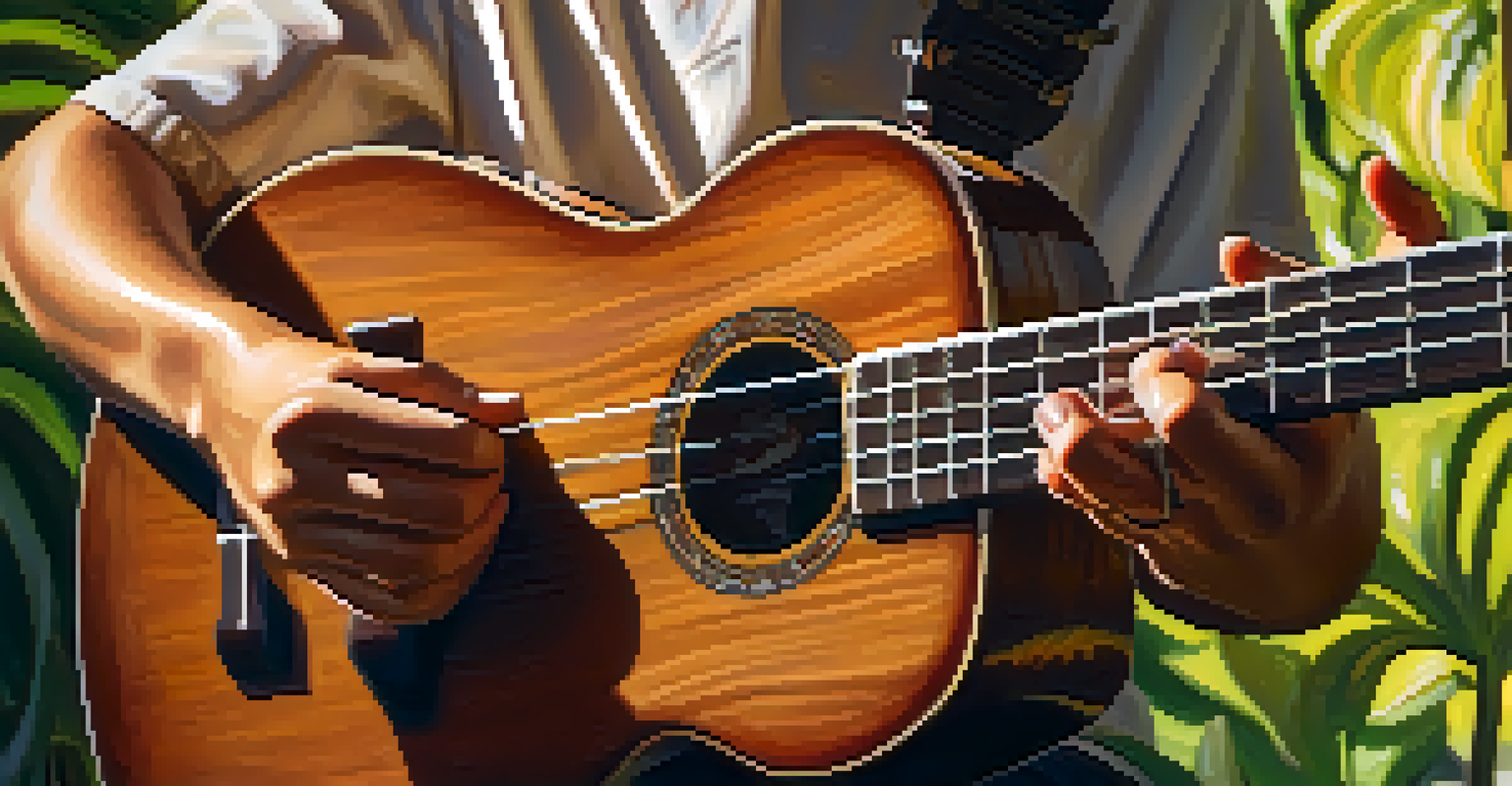Ukulele: A Tool for Emotional Expression in Therapy Settings

The Emotional Power of Music Therapy
Music has a unique ability to evoke emotions, making it a powerful tool in therapy. It can help individuals express feelings that are often hard to articulate, creating a bridge to deeper self-awareness. The ukulele, with its cheerful sound and approachable nature, serves as an excellent instrument for emotional exploration.
Music can change the world because it can change people.
For many, the simple act of strumming a ukulele can bring forth a wave of emotions, facilitating healing and connection. By engaging with music, clients are often able to tap into their feelings and express themselves in a safe environment. This can be particularly beneficial in therapeutic settings where traditional verbal communication may feel intimidating.
In essence, music therapy, particularly with instruments like the ukulele, acts as a catalyst for emotional release. It allows individuals to explore their feelings through melodies and rhythms, making the therapeutic process both enjoyable and impactful.
Why the Ukulele? Its Unique Qualities Explained
The ukulele stands out among musical instruments for several reasons. Its small size and light weight make it easily accessible, which is perfect for individuals of all ages. Moreover, the ukulele is relatively easy to learn, allowing clients to quickly start playing and experiencing the joy of music-making.

Another appealing aspect of the ukulele is its bright, uplifting sound. It often evokes feelings of happiness and nostalgia, creating a positive atmosphere in therapy sessions. This can be especially helpful for clients who may struggle with negative emotions, as the ukulele encourages a shift towards more positive feelings.
Ukulele Enhances Emotional Healing
The ukulele's cheerful sound and ease of play help individuals express emotions and foster healing in therapeutic settings.
Additionally, the ukulele's versatility allows for a wide range of musical styles, from gentle lullabies to lively tunes. This variety means clients can select music that resonates with their personal experiences, further enhancing their emotional expression during therapy.
Building Confidence through Music
Playing the ukulele can significantly boost a person's confidence, especially in a therapeutic context. As clients learn to play and share their music, they often experience a sense of accomplishment. This newfound confidence can translate into other areas of their lives, helping them face challenges with a more positive mindset.
Where words fail, music speaks.
Additionally, the social aspect of playing music with others can foster connection and support. Group therapy sessions featuring the ukulele promote collaboration, allowing participants to share their musical journey together. This sense of community can be incredibly empowering, reinforcing the idea that they are not alone in their struggles.
Ultimately, the ukulele serves as a tool that not only enhances musical skills but also nurtures personal growth. As clients gain confidence in their musical abilities, they often feel more comfortable expressing themselves emotionally, leading to deeper healing.
Fostering Emotional Connections through Group Sessions
Group therapy sessions with the ukulele can create a unique environment for emotional connection. When individuals come together to play and share music, they build bonds that can be incredibly healing. This collective experience promotes empathy and understanding, as participants resonate with each other's stories and feelings.
As clients engage in group playing, they learn to listen not only to the music but also to each other. This active listening cultivates a deeper sense of compassion, allowing individuals to feel seen and heard. The shared experience of creating music together fosters trust, which is essential for effective therapy.
Building Confidence Through Music
Playing the ukulele boosts confidence and encourages personal growth, as clients experience accomplishment and connection in a supportive environment.
Moreover, in a group setting, clients can experiment with expressing their emotions through song. Whether it's writing their own lyrics or performing a favorite tune, the ukulele becomes a shared language that transcends words, enabling participants to connect on a deeper emotional level.
The Therapeutic Process: From Learning to Healing
The journey of learning to play the ukulele can mirror the therapeutic process itself. As clients navigate challenges in mastering the instrument, they often reflect on their personal struggles. This parallel can provide valuable insights, allowing individuals to understand their emotions in a new light.
Therapists can guide clients through this exploration, using music as a metaphor for overcoming obstacles. Just as mastering a song takes patience and practice, so too does healing from emotional pain. This connection can help clients develop resilience and a growth mindset, essential for their therapeutic journey.
Ultimately, the ukulele serves not only as a means of expression but also as a tool for self-discovery. Clients can learn to embrace their imperfections and celebrate their progress, reinforcing the idea that healing is a continuous journey, much like learning a new musical skill.
Incorporating the Ukulele into Various Therapeutic Approaches
The ukulele can be seamlessly integrated into various therapeutic approaches, enhancing the overall experience for clients. Whether it's cognitive-behavioral therapy, art therapy, or mindfulness practices, music can serve as a powerful adjunct. Therapists can tailor their sessions to incorporate the ukulele in ways that resonate with individual clients' needs.
For example, in cognitive-behavioral therapy, clients can use the ukulele to create songs that reflect their thoughts and feelings. This process encourages self-reflection and helps identify negative thought patterns in a creative way. By transforming emotions into music, clients gain a new perspective on their challenges.
Group Sessions Foster Connection
Group therapy sessions with the ukulele create a unique environment for emotional connection, promoting empathy and trust among participants.
Similarly, in mindfulness practices, playing the ukulele can encourage clients to stay present in the moment. The focus required to play the instrument effectively can draw their attention away from anxiety and stress, promoting a sense of calm and centeredness. This integration allows for a holistic approach to healing through music.
Real-Life Examples of Ukulele in Therapy
Across the globe, therapists are successfully using the ukulele in various therapeutic settings. For instance, in addiction recovery programs, music therapy sessions featuring the ukulele have shown promising results. Clients often find solace in playing music, which helps them cope with cravings and triggers.
In pediatric therapy, children with emotional or developmental challenges have benefited immensely from engaging with the ukulele. The instrument's playful nature encourages kids to express themselves freely, often resulting in breakthroughs in communication and emotional understanding. Through music, children can explore their feelings in a fun and engaging way.

These real-life examples highlight the transformative power of the ukulele in therapy. By facilitating emotional expression and connection, the ukulele proves to be more than just an instrument; it becomes a vital tool for healing and personal growth.